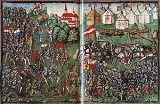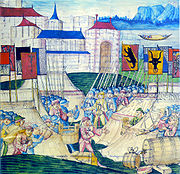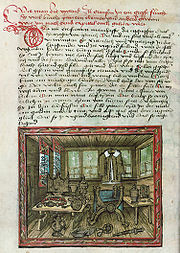
Battle of Grandson
Encyclopedia
The Battle of Grandson, took place on 2 March 1476, was part of the Burgundian Wars
, and resulted in a major defeat for Charles the Bold, Duke of Burgundy
.
 In late February 1476, Charles the Bold, also called Charles the Rash, besieged the castle of Grandson
In late February 1476, Charles the Bold, also called Charles the Rash, besieged the castle of Grandson
, located on the lake of Neuchâtel. Grandson belonged to Charles' ally Jacques de Savoie, and the place had been brutally taken by the Swiss the previous year. Charles brought a large mercenary
army with him together with many heavy cannon
, and the Swiss garrison
soon feared, after the effectiveness of the bombardment was demonstrated, that they would be killed when their fortress was stormed. The Swiss, under heavy pressure from the canton of Bern, organized an army to come to the garrison's relief. A boat approached the garrison with the news that an army was coming to its relief, but the vessel was unable to approach the fortress closely for fear that it would be hit by Burgundian cannons. The men in the boat gestured to the defenders in the fortress to inform them that help was on the way, but their gestures were misunderstood, and the garrison decided to surrender.

 The Swiss had no news of the fate of the garrison and assembled their forces in the hope of lifting the siege. This army numbered a little over 20,000 men without artillery and probably slightly outnumbered the Burgundians. On 2 March 1476 the Swiss army approached the forces of Charles near the town of Concise
The Swiss had no news of the fate of the garrison and assembled their forces in the hope of lifting the siege. This army numbered a little over 20,000 men without artillery and probably slightly outnumbered the Burgundians. On 2 March 1476 the Swiss army approached the forces of Charles near the town of Concise
. The Swiss, eager to avenge their slaughtered countrymen, advanced in three heavy columns, echeloned to the left rear, moving directly into combat without deploying, in typical Swiss fashion. Poor reconnaissance left Charles uninformed as to the size and deployment of the Swiss, and he believed that the Swiss vanguard was the entire force sent against him. The vanguard, consisting mainly of men from Schwyz
, Bern, and Solothurn
, realized they would soon be in battle and knelt to pray. When they said three Our Fathers and three Hail Marys, some of the Burgundian army reportedly mistook their actions as a sign of submission. In their zeal, they rode forward shouting, "You will get no mercy; you must all die." The Burgundian knights soon surrounded the Swiss vanguard, but then Charles made a serious mistake. After brief skirmishing, Charles ordered his cavalry to pull back so the artillery could reduce the Swiss forces before the attacks were renewed. At this time, the main body of the Swiss emerged from a forest which had hitherto obscured their approach. The Burgundian army, already pulling back, soon became confused when the second, and larger, body of Swiss troops appeared. The speed of the Swiss advance did not give the Burgundians time to make much use of their artillery and missile units. Charles attempted a double envelopment of the leading Swiss column before the other two arrived, but as his troops were caught shifting to make this attack, they caught sight of the other Swiss columns and retreated in panic. The withdrawal soon turned into a rout when the Burgundian army broke ranks and ran. For a time, Charles rode among them shouting orders for them to stop and hitting fleeing soldiers with the flat of his sword. But once started the rout was unstoppable, and Charles was forced to flee as well. Few casualties were suffered on either side: the Swiss did not have the cavalry necessary to chase the Burgundians far. At insignificant cost to themselves, the Swiss had humiliated the greatest duke in Europe, defeated one of the most feared armies, and taken a most impressive amount of treasure. The booty Charles carried with him was most impressive, and included jewelery, silver and gold plate, tapestries and much of Charles' artillery. The Swiss initially had little idea of its value. What is probably a small surviving part of this fantastic booty is on display in various Swiss museums today, whilst a few remaining artillery pieces can be seen in the museum of La Neuveville
, near Neuchâtel, Switzerland.
Charles had attempted to break the will of the Swiss by killing anyone of their countrymen he could apprehend. Instead he united them as never before in an attempt to destroy him. When the Burgundians met the Swiss at the Battle of Murten (Morat in French) in June 1476, the Swiss annihilated his army.
Burgundian Wars
The Burgundian Wars were a conflict between the Dukes of Burgundy and the Kings of France, later involving the Old Swiss Confederacy, which would play a decisive role. Open war broke out in 1474, and in the following years the Duke of Burgundy, Charles the Bold, was defeated three times on the...
, and resulted in a major defeat for Charles the Bold, Duke of Burgundy
Duchy of Burgundy
The Duchy of Burgundy , was heir to an ancient and prestigious reputation and a large division of the lands of the Second Kingdom of Burgundy and in its own right was one of the geographically larger ducal territories in the emergence of Early Modern Europe from Medieval Europe.Even in that...
.
Siege of Grandson, February 1476

Grandson, Switzerland
Grandson is a municipality in the district of Jura-Nord Vaudois in the canton of Vaud in Switzerland.During the Burgundian Wars, Charles the Bold was defeated near here in the Battle of Grandson on 2 March 1476.-History:...
, located on the lake of Neuchâtel. Grandson belonged to Charles' ally Jacques de Savoie, and the place had been brutally taken by the Swiss the previous year. Charles brought a large mercenary
Mercenary
A mercenary, is a person who takes part in an armed conflict based on the promise of material compensation rather than having a direct interest in, or a legal obligation to, the conflict itself. A non-conscript professional member of a regular army is not considered to be a mercenary although he...
army with him together with many heavy cannon
Cannon
A cannon is any piece of artillery that uses gunpowder or other usually explosive-based propellents to launch a projectile. Cannon vary in caliber, range, mobility, rate of fire, angle of fire, and firepower; different forms of cannon combine and balance these attributes in varying degrees,...
, and the Swiss garrison
Garrison
Garrison is the collective term for a body of troops stationed in a particular location, originally to guard it, but now often simply using it as a home base....
soon feared, after the effectiveness of the bombardment was demonstrated, that they would be killed when their fortress was stormed. The Swiss, under heavy pressure from the canton of Bern, organized an army to come to the garrison's relief. A boat approached the garrison with the news that an army was coming to its relief, but the vessel was unable to approach the fortress closely for fear that it would be hit by Burgundian cannons. The men in the boat gestured to the defenders in the fortress to inform them that help was on the way, but their gestures were misunderstood, and the garrison decided to surrender.
Execution of the Garrison of Grandson
Swiss sources are unanimous in stating that the men only gave up when Charles assured them they would be spared. The historian Panigarola, who was with Charles, claimed that the garrison had thrown themselves on the mercy of the duke, and it was up to his discretion of what to do with them. He ordered all 412 men of the garrison to be executed. In a scene Panigarola described as "shocking and horrible" and sure to fill the Swiss with dread, all the victims were led past the tent of Charles on 28 February 1476 and hanged from trees, or drowned in the lake, in an execution that lasted four hours.Battle of Grandson


Concise
Concise is a municipality in the district of Jura-Nord Vaudois in the canton of Vaud in Switzerland.-Geography:Concise has an area, , of . Of this area, or 24.4% is used for agricultural purposes, while or 66.3% is forested...
. The Swiss, eager to avenge their slaughtered countrymen, advanced in three heavy columns, echeloned to the left rear, moving directly into combat without deploying, in typical Swiss fashion. Poor reconnaissance left Charles uninformed as to the size and deployment of the Swiss, and he believed that the Swiss vanguard was the entire force sent against him. The vanguard, consisting mainly of men from Schwyz
Schwyz
The town of is the capital of the canton of Schwyz in Switzerland.The Federal Charter of 1291 or Bundesbrief, the charter that eventually led to the foundation of Switzerland, can be seen at the Bundesbriefmuseum.-History of the toponym:...
, Bern, and Solothurn
Solothurn
The city of Solothurn is the capital of the Canton of Solothurn in Switzerland. The city also comprises the only municipality of the district of the same name.-Pre-roman settlement:...
, realized they would soon be in battle and knelt to pray. When they said three Our Fathers and three Hail Marys, some of the Burgundian army reportedly mistook their actions as a sign of submission. In their zeal, they rode forward shouting, "You will get no mercy; you must all die." The Burgundian knights soon surrounded the Swiss vanguard, but then Charles made a serious mistake. After brief skirmishing, Charles ordered his cavalry to pull back so the artillery could reduce the Swiss forces before the attacks were renewed. At this time, the main body of the Swiss emerged from a forest which had hitherto obscured their approach. The Burgundian army, already pulling back, soon became confused when the second, and larger, body of Swiss troops appeared. The speed of the Swiss advance did not give the Burgundians time to make much use of their artillery and missile units. Charles attempted a double envelopment of the leading Swiss column before the other two arrived, but as his troops were caught shifting to make this attack, they caught sight of the other Swiss columns and retreated in panic. The withdrawal soon turned into a rout when the Burgundian army broke ranks and ran. For a time, Charles rode among them shouting orders for them to stop and hitting fleeing soldiers with the flat of his sword. But once started the rout was unstoppable, and Charles was forced to flee as well. Few casualties were suffered on either side: the Swiss did not have the cavalry necessary to chase the Burgundians far. At insignificant cost to themselves, the Swiss had humiliated the greatest duke in Europe, defeated one of the most feared armies, and taken a most impressive amount of treasure. The booty Charles carried with him was most impressive, and included jewelery, silver and gold plate, tapestries and much of Charles' artillery. The Swiss initially had little idea of its value. What is probably a small surviving part of this fantastic booty is on display in various Swiss museums today, whilst a few remaining artillery pieces can be seen in the museum of La Neuveville
La Neuveville
La Neuveville is a municipality in the Jura bernois administrative district in the canton of Bern in Switzerland, located in the French-speaking Bernese Jura .-Geography:...
, near Neuchâtel, Switzerland.
Aftermath
After the battle, the Swiss troops came upon the bodies of their countrymen still hanging from trees. An eyewitness, Peterman Etterlin, described the scene: "There were found sadly the honorable men still freshly hanging on the trees in front of the castle whom the tyrant had hanged. It was a wretched, pitiable sight. There were hung ten or twenty men on one bough. The trees were bent down and were completely full. There hanged a father and a son next to each other, there two brothers or other friends. And there came the honorable men who knew them; who were their friends, cousins and brothers, who found them miserably hanging. There was first anger and distress in crying and bewailing. ..."Charles had attempted to break the will of the Swiss by killing anyone of their countrymen he could apprehend. Instead he united them as never before in an attempt to destroy him. When the Burgundians met the Swiss at the Battle of Murten (Morat in French) in June 1476, the Swiss annihilated his army.

